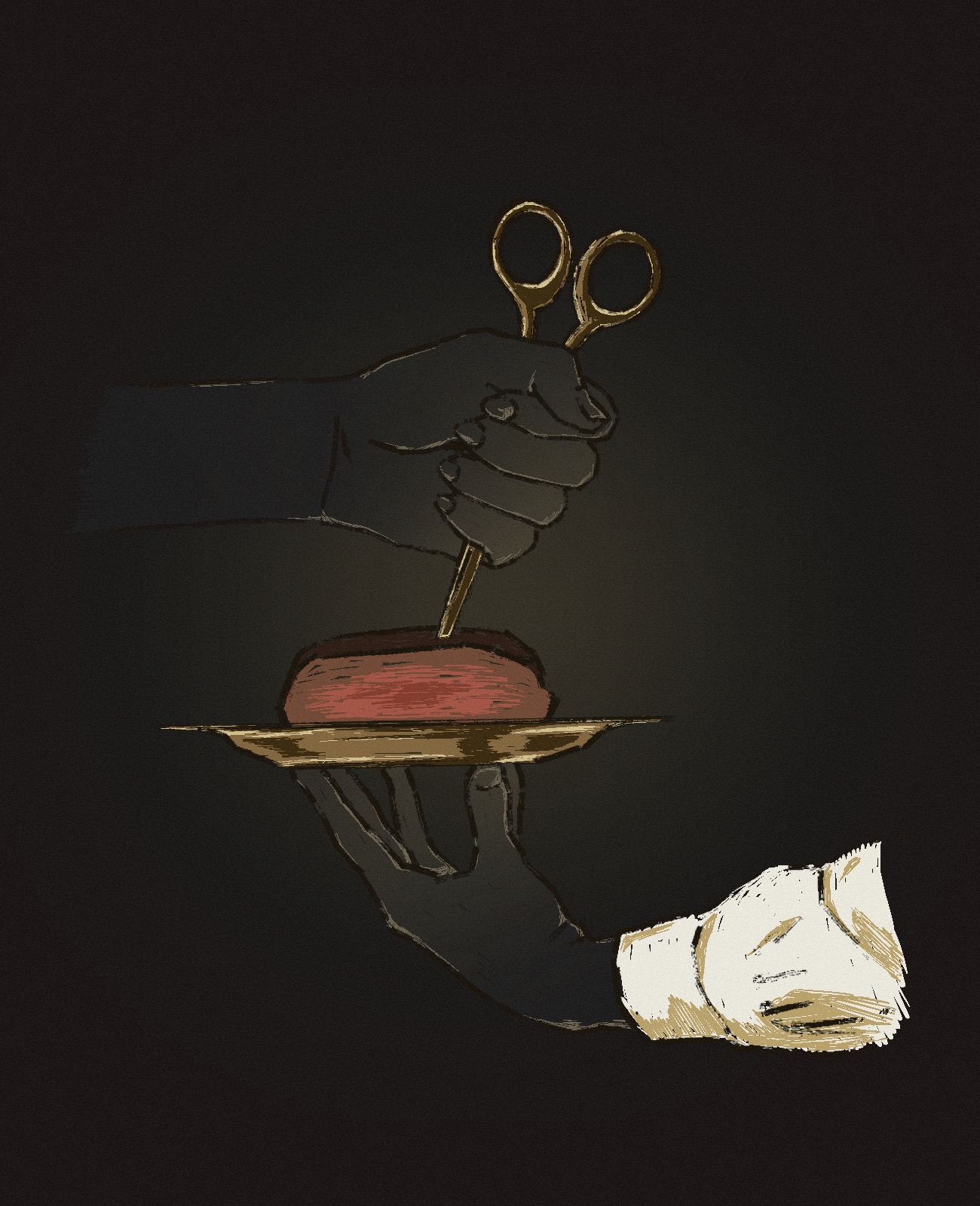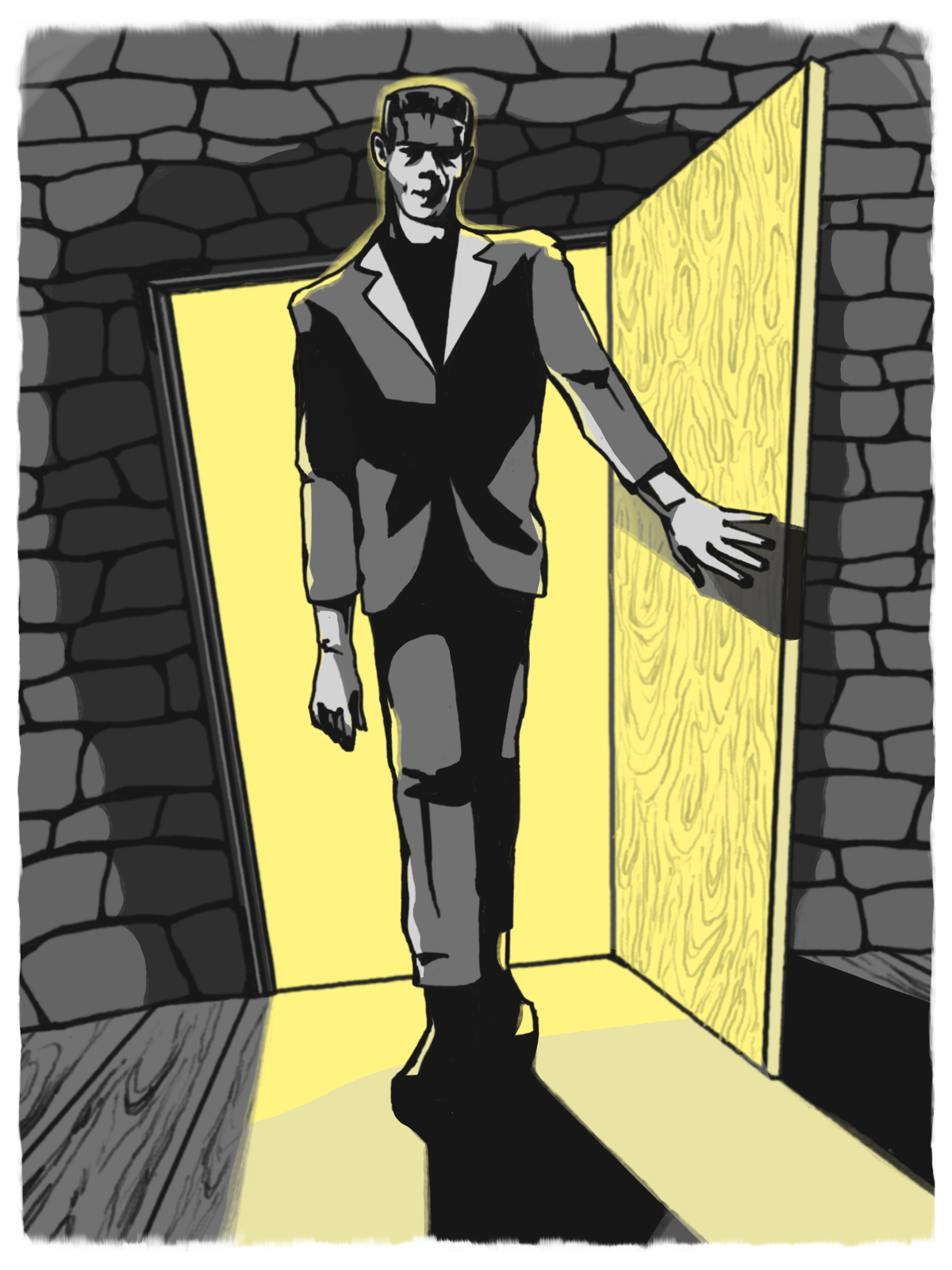Second Take: Class satire genre contrasts wealthy, working classes through dark comedy

(Isabella Lee/Illustrations Director)
By Chloe Colligan
Jan. 31, 2023 9:22 p.m.
Cinema’s clash of the classes paints a frightening portrait of a status-obsessed society. From rags-to-riches stories of the self-made man portrayed in movies such as “The Wolf of Wall Street” to cryptic depictions of the tiresome nature of consumerism shown in “Fight Club,” cinema has long tackled capitalism and its pitfalls. Recently, though, an emerging genre has begun to dominate the cinematic lens on capitalism: class satire. Through an ironic contrast between the working class and the wealthy which serves an underlying dark comedy, this noteworthy genre attempts to astutely shed light on the timeless dance between master and servant.
With the recent popularization of movies such as “The Menu,” “Triangle of Sadness” and the HBO series “The White Lotus,” class satire has firmly established itself as its own genre. Common in all three examples, the meeting ground for the classes tends to be in a luxurious, isolated setting for the uber-wealthy. The use of these over-the-top status symbols is at the heart of the satire, poking fun at the notion that the upper classes only interact with those of a lower status when they are being waited upon.
[Related: Second Take: Studios fail to uplift people of color in true crime miniseries]
Even more startling are the interactions themselves. In each film, the workers are treated as nonpersons – mere extensions of the boat, the restaurant or the hotels – and valued solely for their ability to satisfy and serve every whim of the higher-status guests. At the beginning of season one of “The White Lotus,” as the guests arrive for their stay at the titular luxury hotel in Hawaii, the hotel manager Armond (Murray Bartlett) says to new hire Lani (Jolene Purdy), “Self-disclosure is discouraged. … We are asked to disappear behind our masks as pleasant, interchangeable helpers.” The manager gives her crew members similar instructions in “Triangle of Sadness,” stating, “It’s always, ‘Yes, sir! Yes, ma’am!’” to any of the guests’ requests. In response, the crew members vigorously clap and chant, “Money, money, money!”
The essence of the class satire genre lies in the implicit dehumanization of the service worker. At first, the critique of the rich is subtle. One could miss it if they are unaware that the film or series is supposed to be a comedy. An example is during the second course in “The Menu” when Ms. Bloom (Janet McTeer), a self-identified food critic, complains about a broken emulsified sauce. With a gasp, she utters, “You really shouldn’t see that in a restaurant of this quality.” In response, renowned head chef Julian Slowik (Ralph Fiennes) brings a large bowl of more broken emulsion to her.
Eventually, this critique turns into a full-fledged attack. By the fourth course, labeled “The Mess,” Slowik reveals his more sinister intentions for the guests. Fed up with years of serving the rich, he desires revenge in the form of a 12-course meal where everyone, himself included, will die by the end. A similar shadow overtakes the “Triangle of Sadness” when a huge storm hits the yacht, causing most of the guests to get violently seasick. While watching scenes of vomiting, the captain says over the megaphone, “While you’re swimming in abundance, the rest of the world is drowning in misery.”
Through these scenes, the two films insinuate that the only way to infiltrate the island of oblivion – home to the top 1% – is to spread these embittered messages when the wealthy are suffering from either illness or fear. Even then, it seems the elite guests do not comprehend the meaning behind these capitalistic rants.
By this point in both movies, a key juxtaposition arises between the subtle dehumanization of the service worker and the affluent, who seem to have foregone their own innate humanness. One vessel for spreading this message is the contrast between basic needs and overabundance. This is depicted in “Triangle of Sadness,” where the luxuries of yacht life in part two are in direct opposition to the bleak reality of survival on a secluded island in part three. On this island, survival skills become the new status symbol as Abigail (Dolly De Leon), a former cleaner on the yacht and the only one capable of catching fish and making fire, rises to the top of the social hierarchy.
The commentary on status is solidified through the film’s ambiguous ending, where Abigail contemplates murdering Yaya (Charlbi Dean) rather than returning to the bottom of the real world’s social structure. Alarmingly, Abigail’s actions and Slowik’s revenge meal seem to pose a key question as to what outlet there is for the desperation of the lower classes other than violence.
[Related: Second Take: International series outpace Hollywood productions with creative stories, themes]
There is no denying that all of these movies are filled with entertaining yet poignant irony. But ultimately, through this use of humor, they convey a darker message about the timeless tug of war between the haves and the have-nots – the uncomfortable clash between people desperate for money and people who have so much of it they abuse its power.
The characters, while exaggerated, are not mere caricatures but are rather grounded in comedic realism. The culmination of these tense class dynamics and the grievances of the lower classes in the form of violence is impossible to ignore. Tired of the mistreatment from the wealthy and of being a cog in the capitalistic assembly line, Abigail, Slowik and Armond turn their rage into revenge. These revenge plots in some ways seem to be insinuating that violence is the only vessel for change in seemingly stagnant, status-obsessed economies.
As Abigail approaches Yaya with a large rock and Slowik roasts his guests like s’mores, the screens may fade to black, but the dark shadow these movies cast upon reality continues to linger long after.



